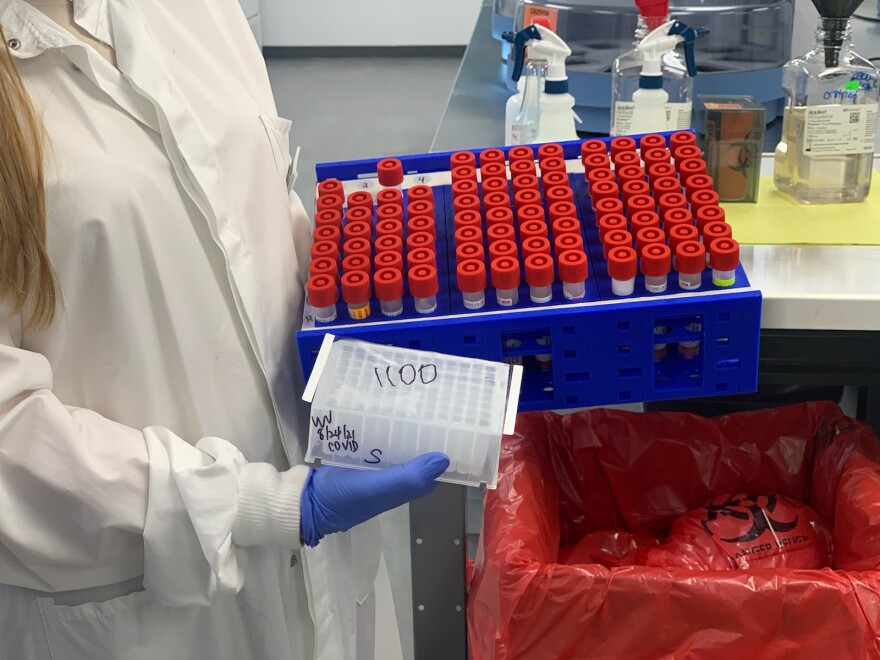From Enterprise Drive, Reditus Laboratories looks like any other single-story beige commercial building along this Pekin commercial corridor.
Inside, however, workers in lab coats shuffle from room to room carrying pipettes, vials, clipboards with patient data and other equipment as they perform thousands of COVID-19 tests each week.
In one room, about a half-dozen large box-shaped machines are performing polymerase chain reaction (PCR) testing of COVID-19 test kits. An Illumina NextSeq genetic sequencing machine is testing positive results for the rapidly spreading Delta variant.
“In that room there’s probably four or five million dollars of equipment,” Reditus CEO Dr. Aaron Rossi said during a tour of the facility.
Rossi, a Central Illinois native who lives in the Bloomington area, opened Reditus in 2019 as a histology laboratory with 10 employees. Assisted by a $100,000 loan from the Pekin City Council, the company now has 300 employees and has performed more than 2.5 million COVID-19 tests since April 2020.
Mass vaccination did not slow down the need for testing. In fact, Rossi said, testing is all the more important given the infectiousness of variant strains. He's building more lab space to keep up with demand.
“People are seeing that … vaccinated people are still testing positive,” he said. “How can we keep everybody safe, and still keep the world going forward?”

Before the pandemic, Rossi learned about PCR testing’s ability to test for bacteria in wounds much faster than standard lab cultures that typically take days to return results.
Interested in the technology, Rossi invested in one PCR device.
“They said it was ‘experimental.’ It’s not experimental,” he said. “Everyone just has blinders on.”
Then the COVID-19 pandemic broke out. PCR testing proved to be a critical tool in mass testing of coronavirus, and because Reditus was one of few facilities in the country that had established PCR testing, Rossi’s business exploded.

In addition to COVID-19 testing, Reditus still tests for bacteria and viruses. During the lab tour, employee Tamie Yost loaded three patient samples into a machine that would perform a complete blood count (CBC) panel.
Lots of labs offer COVID-19 testing, but Rossi said his testing capabilities are so high-tech that he can successfully isolate variants.

On Aug. 12, 99 percent of genome-sequenced positive coronavirus tests analyzed by Reditus carried the Delta strain. In May, Reditus only identified one single case of the variant. Even Rossi said he’s surprised by how rapidly Delta mutated to become the dominant strain in the country.
Highly sensitive tests will make all the difference in coming months as vaccinated people try to know whether they’ve been infected with a “breakthrough” case of coronavirus, Rossi said.

Some tests, such as the saliva-based SHIELD Illinois test being utilized by Illinois State University, may not be sensitive enough to pick up positive Delta cases among vaccinated people, he said.
While also PCR-based, SHIELD tests skip a critical “wash solution” step — a step that requires the use of a $75,000 machine made by Fischer Scientific, Rossi said. (These are the machines former President Donald Trump stood next to during a press conference, Rossi noted during the tour.)

Antigen tests, known as “rapid tests,” have similar pitfalls.
Reditus is experimenting with other technologies, too. For example, a cooling testing system allows Rossi to test five samples at once. If a sample flags the rack as positive, each patient sample is then tested individually.
“We do it one by one,” he said. “If it’s a positive, we verify it with our own two eyes.”

As schools reopen amid the spread of the Delta variant, Rossi said he’s having conversations with local school districts regarding testing contracts for the fall semester. Reditus already has landed mass testing contacts with the state of Illinois and Peoria Public Schools District 150.
At this point, Rossi said he's most concerned that the COVID-19 positivity rate is "extremely elevated" now compared to this time last year, adding fewer tests are being administered now than this time last year.
"The data shows it's beneficial to be vaccinated for sure, without a doubt. But you're not immune to COVID-19," he said. "This thing has been moving so quickly, mutating so quickly. It's very concerning."











